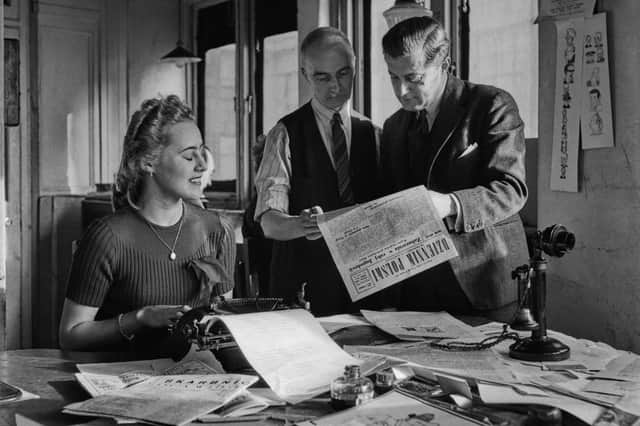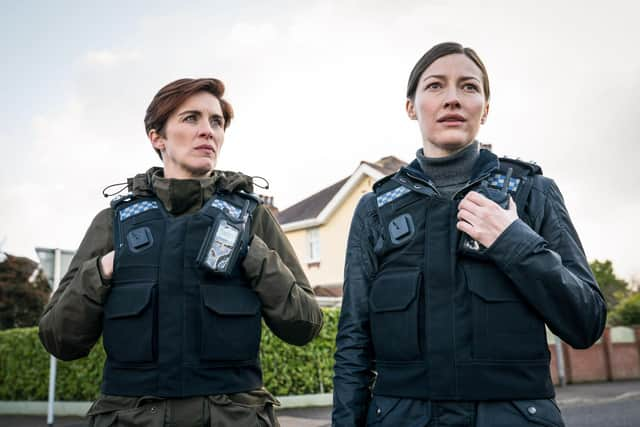Line of Duty: police jargon may be confusing but it's nothing compared to these newspaper terms


From ACC (Assistant Chief Constable) to AC-12 (anti-corruption unit 12) and not to mention an OCG (organised crime group), unless you actually work in the police you need a glossary of terms to try and untangle what on earth they are on about in the hit BBC cop show.
Of course every industry has its jargon (I struggle to translate my sister who works in IT and often stare back glassy-eyed mid-conversation) but I would wager that the police come only second to journalists when it comes to a spoken shorthand of gibberish.
Advertisement
Hide AdAdvertisement
Hide AdSo police have their CHIS (covert human intelligence source) and the PNC (police national computer), not to mention their AFO (Authorised firearms officer) and their MIT (murder investigation team) and their IRV (incident response vehicle).


But I would like to up their nonsense with journalism’s internal language - or more specifically newspapers.
From NIBS (news in brief) to Backup (smaller stories to fill pages), reporters are often guilty of spouting phrases like ‘Spike’ – an old-fashioned term for ditching a story that comes from the story literally being put on a metal spike in its paper form (yes I know - health and safety were not keen).
Advertisement
Hide AdAdvertisement
Hide AdThen there is flatplan (the layout of what the paper will look like) and copy (the story itself) to widow (an overhanging short line or end of hyphenated word) to orphan (a paragraph opening line that falls at the beginning of a following page or column) to ROP (run of press: news not adverts) and the DPS (double page spread) - we give Line of Duty a run for its money.
Of course there is far more. We call an exclamation mark a ‘dog’s dick' - the derogatory nature of the description a hint at our feelings on unnecessary punctuation.
Then splash, (front page story), back of book (story to rear of paper), cuttings, head shots, standalone, leads, a bit fish and chippy.
Hold the front page, it's all gibberish.
Glossary of terms from newspapers / journalism (there are many more!)
Nib: News in brief
Backup: Filling space around main stories
Grout: As above
Filler: As above again
Spike: A story not being used
Back of book: A story not in lead news agenda
Standalone: A picture-led story with a caption
Byline: The reporter's name
Subhead: The subsidiary strapline under the headline
Dog's dick: An exclamation mark
Widow: an overhanging short line or end of hyphenated word
Advertisement
Hide AdAdvertisement
Hide AdOrphan: A paragraph opening line that falls at the beginning of a following page or column
DBW (Dull but worthy): An important, if not interesting, story
File copy: to submit a story
Point, par: Paragraph end with full stop, new paragraph
Fish and chippy: Pointless story
Headshot/ Mugshot (here we agree with police): Literally a head-only photograph, usually of a criminal offender
Intro: First line of a story
Kicker (two meanings): Either the capped up word in a caption or the final line of a story
Off stone: Paper has gone to press and print run has begun
Advertisement
Hide AdAdvertisement
Hide AdLiteral: A typo or error, not necessarily a spelling mistake
Glossary of terms from Line of Duty / police:
SitRep (Situation Report)
CHIS (covert human intelligence source)
MIT (murder investigation team)
PNC (police national computer)
TA (tactical advisor).
TFC – Tactical Firearms Commander
AFO – Authorised Firearms Officer
SFC – Strategic Firearms Commander
CSE – Crime Scene Examiner
FI – Forensic Investigator
FLO – Family Liaison Officer
FME – Forensics Medical Examiner
PCSO – Police Community Support Officer
SIO – Senior Investigating Officer
UCO – Undercover Officer
DC – Detective Constable (cops who have passed their detective exams get a “D” instead of “P” before their rank)
DS – Detective Sergeant
DI – Detective Inspector
DCI – Detective Chief Inspector
Det Supt – Detective Superintendent
DCS – Detective Chief Superintendent
ACC – Assistant Chief Constable
DCC – Detective Chief Constable
CC – Chief Constable
ARU – armed response unit
CPS – Crown Prosecution Service
DIR – digital interview recorder
DPS – Directorate of Professional Standards
ED905 – this is just an arbitrary code. In series five it represents a truck load of heroin.
IRV – incident response vehicle
MoPI – Management of Police Information
OCG – organised crime group
PR – police regulations
A version of this story was originally published on our sister title, the Lancashire Post